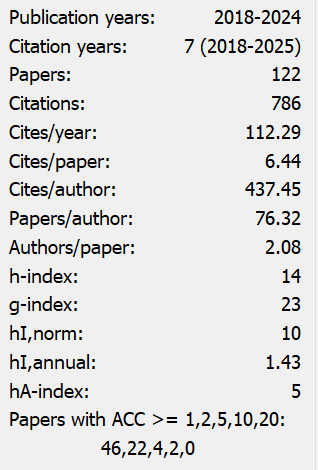Research on Innovative Pathways for Empowering Corporate Financial Management with Generative Artificial Intelligence
Abstract
With the rapid advancement of digital transformation and artificial intelligence technologies, generative artificial intelligence (Generative AI) has shown broad application prospects in the domain of corporate management. Based on the Technology–Organization–Environment (TOE) theoretical framework and value-chain reengineering theory, this paper constructs an optimized model for empowering corporate financial management with Generative AI. First, it analyzes the core capabilities of generative models in data synthesis, text comprehension, and decision support, and explores innovative pathways for multi-scenario automatic budget preparation, dynamic financial forecasting, and automated compliance audit report generation within the contexts of corporate budgeting, predictive analysis, and risk control. Second, it proposes implementation strategies—such as organizational restructuring, enhancement of data-governance systems, and establishment of continuous iteration mechanisms—and, drawing on representative enterprise case studies, demonstrates how Generative AI improves forecast accuracy, optimizes risk alerts, and enhances audit efficiency. Finally, it addresses challenges related to model bias, data-privacy protection, computational resource investment, and algorithmic transparency, offering technical improvements and governance measures to guide enterprises in deploying Generative AI applications under compliance and ethical constraints. The study shows that Generative AI not only elevates the intelligence level of financial management but also drives enterprise value creation and sustained innovation through dynamic decision support.
References
[2] Budhwar, P., Singh, S. K., & Pathak, R. (2023). Human resource management in the age of generative artificial intelligence: Perspectives and research directions on ChatGPT. Human Resource Management Journal, 33(3), 606–659.
[3] Onotole, E. F., Olorunsola, E. O., & Owolabi, S. A. (2022). The Role of Generative AI in developing new Supply Chain Strategies-Future Trends and Innovations. International Journal of Supply Chain Management, 11(4), 325–338. https://doi.org/10.54660/.IJMRGE.2022.3.1-638-646
[4] Abrokwah-Larbi, K. (2023). The role of generative artificial intelligence (GAI) in customer personalisation (CP) development in SMEs: A theoretical framework and research propositions. Industrial Artificial Intelligence, 1(1), 11. https://doi.org/10.1007/s44244-023-00012-4
[5] George, B., & Wooden, O. (2023). Managing the strategic transformation of higher education through artificial intelligence. Administrative Sciences, 13(9), 196. https://doi.org/10.3390/admsci13090196
[6] Pattanayak, S. (2021). Navigating Ethical Challenges in Business Consulting with Generative AI: Balancing Innovation and Responsibility. International Journal of Enhanced Research in Management & Computer Applications, 10(2), 24–32.
[7] Hamzat, L., Abiodun, D., & Joseph, A. (2023). Empowering entrepreneurial growth through data-driven financial literacy, market research, and personalized education tool. World Journal of Advanced Research and Reviews, 19(2), 1692–1711. https://doi.org/10.30574/wjarr.2023.19.2.1568
[8] Bahroun, Z., Alshurideh, M. T., Al-Dmour, R. H., & Al-Hawary, S. I. S. (2023). Transforming education: A comprehensive review of generative artificial intelligence in educational settings through bibliometric and content analysis. Sustainability, 15(17), 12983. https://doi.org/10.3390/su151712983
[9] Richey Jr, R. G., Koufteros, X. A., & Williams, J. (2023). Artificial intelligence in logistics and supply chain management: A primer and roadmap for research. Journal of Business Logistics, 44(4), 532–549. https://doi.org/10.1111/jbl.12364
[10] George, A. S. (2023). Future economic implications of artificial intelligence. Partners Universal International Research Journal, 2(3), 20–39.
[11] Nedungadi, P., Tang, K.-Y., & Raman, R. (2024). The transformative power of generative artificial intelligence for achieving the sustainable development goal of quality education. Sustainability, 16(22), 9779. https://doi.org/10.3390/su16229779
[12] Jourabchi Amirkhizi, P., Fathi, M., Hosseini, S. M., & Rabbani, M. (2025). Generative Artificial Intelligence in Adaptive Social Manufacturing: A Pathway to Achieving Industry 5.0 Sustainability Goals. Processes, 13(4), 1174. https://doi.org/10.3390/pr13041174
[13] Addy, W. A., Sarfo, P. A., Owusu, J., & Mensah, L. (2024). Transforming financial planning with AI-driven analysis: A review and application insights. World Journal of Advanced Engineering Technology and Sciences, 11(1), 240–257. https://doi.org/10.30574/wjaets.2024.11.1.0053
[14] Stanoevska, E. P. (2024). Generative Artificial Intelligence, Threat or Challenge for the Modern Banking System. Knowledge-International Journal, 66(1), 53–59.
[15] Al-Mamary, Y. H. (2025). The transformative power of artificial intelligence in entrepreneurship: Exploring AI’s capabilities for the success of entrepreneurial ventures. Future Business Journal, 11(1), 104. https://doi.org/10.1186/s43093-025-00533-7
[16] Dogru, T., Sirakaya-Turk, E., & Tasci, A. D. A. (2025). Generative artificial intelligence in the hospitality and tourism industry: Developing a framework for future research. Journal of Hospitality & Tourism Research, 49(2), 235–253. https://doi.org/10.1177/10963480231188663
[17] Liu, A., & Wang, S. (2024). Generative artificial intelligence (GenAI) and entrepreneurial performance: Implications for entrepreneurs. The Journal of Technology Transfer, 49(6), 2389–2412. https://doi.org/10.1007/s10961-024-10132-3
[18] Khan, S., Mehmood, S., & Khan, S. U. (2025). Navigating innovation in the age of AI: How generative AI and innovation influence organizational performance in the manufacturing sector. Journal of Manufacturing Technology Management, 36(3), 597–620. https://doi.org/10.1108/JMTM-06-2024-0302
[19] Haidar, A., & Abbass, A. (2025). Navigating the frontier of finance: A scoping review of generative AI applications and implications. In Generative Artificial Intelligence in Finance: Large Language Models, Interfaces, and Industry Use Cases to Transform Accounting and Finance Processes (pp. 215–252).
[20] Kang, H.-G., Moon, A., & Jeon, S. (2024). Examining the generative artificial intelligence landscape: Current status and policy strategies. Asia Pacific Journal of Information Systems, 34(1), 150–190. https://doi.org/10.14329/apjis.2024.34.1.150

This work is licensed under a Creative Commons Attribution 4.0 International License.
Copyright for this article is retained by the author(s), with first publication rights granted to the journal.
This is an open-access article distributed under the terms and conditions of the Creative Commons Attribution license (http://creativecommons.org/licenses/by/4.0/).


























